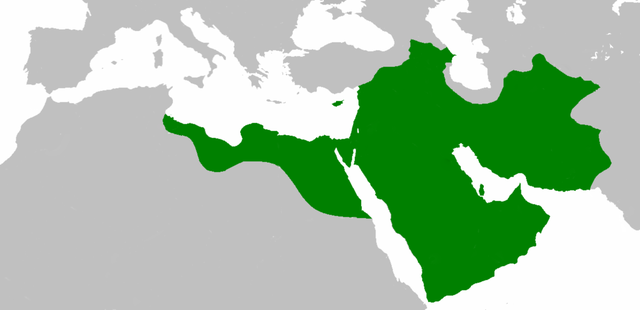In North Africa, after a short Vandal occupation (439 to 534) and then a Byzantine influence (Exarchate of Carthage, c. 590-642), the Arab conquest began at the beginning of the 7th century under the reign of the Umayyad dynasty: “In 639, the Arabs gained a foothold in Africa, only seven years after the death of the Prophet.” In 641, having just conquered Egypt, they founded the city of Al-Fustât (today Cairo) and built the first mosque in Africa. In 670, the Arab general Oqba Ibn Nafi al-Fihri established his camp on the site of what would become the city of Kairouan (today Tunisia), where construction of the Great Mosque of Kairouan began the same year. Despite much resistance, particularly that of the indigenous Berbers (with the historical figures of Koceïla and Kahena in particular), and that of the kingdoms of Nubia, Christianized since the 6th century, the Arabization and Islamization of the Maghreb progressed rapidly.
At the time when the Arabs conquered North Africa, thanks to the trade in gold and salt, the most powerful and richest political entity south of the Sahara was the empire of Ghana. The influence of Islam was quickly felt there; the traders were mostly Muslim, and an Islamized political elite was created around a king who remained, however, like his population, an animist.
The Senegal River area, dominated by the kingdom of Tekrour, was partly Islamized from the 7th century and would be more massively so in the 9th century; the kingdom of Kanem, which would become the kingdom of Kanem-Bornu in the 12th century, established in the 8th century in the north of present-day Chad, was Islamized in the 9th century. The Songhai, mixed with Berbers fleeing the Arab advance, settled at the beginning of the 7th century along the banks of the Niger; they founded a small kingdom, Islamized in the 9th century, which would become the powerful Songhai Empire (whose peak was in the 15th and 16th centuries).
The eastern coast of the continent, bathed by the Indian Ocean, has long been—at least since the beginning of the 1st century, as attested by The Periplus of the Erythraean Sea—turned towards Arabia and, beyond, towards India, China as well as Europe. At the time of the development of Islam, Swahili culture, a cultural mix between Africa and the Arab-Muslim world, developed concomitantly; the Islamization of the area is attested from the 8th century when Muslim trading cities were founded or developed. But Muslim merchants limited their activities to coastal establishments, the hinterland escaping Islamic influences.
The Islamization of sub-Saharan Africa is essentially peaceful and, to some extent, superficial. It is an acculturation and not a colonization or a conquest. The propagation of religion is also the work of sub-Saharan Africans (Hausas, Peuls, Dioulas), who spread the religion while trading. The term “court Islam” is sometimes used to refer to the Muslim elites of commerce, science, and politics who coexist with populations that have remained largely animist.
Further south, in a region populated since the 6th century BC, in the southwest of present-day Nigeria, the Ife civilization (or Ifé) developed around the eponymous city, which became an important city from the 9th century until the 12th century. It remained a major artistic center until the 14th century.
Further south, in the region of present-day Zimbabwe and Mozambique, the Bantus, who arrived in the area around 500 AD, driving out the indigenous San before them, built Great Zimbabwe between the 11th and 13th centuries, the capital of the Monomotapa empire, renowned, even mythical, for its gold. It reached its peak in the 15th century. The Portuguese tried to dominate the empire from the 16th century, attracted by the gold, but they did not succeed until 1629; the Monomotapa of this period had already declined sharply, its gold sources were tending to run out, and the slave trade had come under the domination of the coastal and island states of the east coast.
For more information :
- https://fr.wikipedia.org/wiki/Portail:Afrique
- https://en.wikipedia.org/wiki/Africa
- https://africacenter.org/
- https://journals.openedition.org/etudesafricaines/
- https://etudes-africaines.cnrs.fr/
- https://journals.openedition.org/etudesafricaines/
- https://www.afdb.org/fr/documents-publications/economic-perspectives-en-afrique-2024

